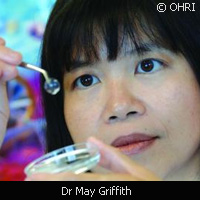How technology gives life to human eyes
Eye surgeons take heart: new research shows how using biosynthetic corneas can help regenerate and repair damaged eye tissue, and give human vision a significant boost. Presented in the journal Science Translational Medicine and funded in part by an EU Marie Curie International Fellowship, the study finds that the optimisation of these implants could provide an effective and safe alternative to donated corneas for patients who need treatment. People who must replace damaged tissue and treat corneal blindness currently depend on human donor corneas for support. However, the global number of donor corneas is extremely low. In order to put a lid on this problem, the researchers from Canada's Ottawa Hospital Research Institute (OHRI, an affiliate of the University of Ottawa), Linköping University in Sweden and the US-based group FibroGen Inc. carried out an early phase clinical trial with 10 patients to determine how biosynthetic corneas can be used to facilitate endogenous (growing or developing from within) tissue regeneration, thereby helping sideline human donor tissue. Unprecedented results of the experiment - and contrary to what is typically reported in human donor transplantation - were that no rejection reaction was experienced by any of the patients, and no extensive immune suppression was needed. 'The biosynthetic implants remained stably integrated and avascular [not associated with blood vessels] for 24 months after surgery, without the need for long-term use of the steroid immunosuppression that is required for traditional allotransplantation,' the authors write. The researchers said they also observed nerve regeneration and restoration of touch sensitivity. 'This study is important because it is the first to show that an artificially fabricated cornea can integrate with the human eye and stimulate regeneration,' explained senior author Dr May Griffith of the OHRI and Linköping University. 'With further research, this approach could help restore sight to millions of people who are waiting for a donated human cornea for transplantation.' The spotlight has been shining on biosynthetic cornea development for over 10 years. Dr Griffith and her colleagues started producing collagen in the laboratory and later moulded it into the shape of a cornea. Dr Griffith then collaborated with Dr Per Fagerholm, an ophthalmologist at Linköping University, to offer the world's maiden biosynthetic cornea implantation for humans. The work involved a clinical trial for 10 Swedes with advanced keratoconus (when the normally round cornea becomes thin and irregular) or central corneal scarring. Each patient received a biosynthetic cornea, and the scientists found that two years after surgery, the cells and nerves from the patients' own corneas had grown into the implant. The 'regenerated' cornea looked normal and had healthy tissue. The scientists discovered that not only did the biosynthetic corneas start generating normal tears, effectively keeping the eye oxygenated, but they also became sensitive to touch. In total, 6 of the 10 patients reported stronger eyesight. 'We are very encouraged by these results and by the great potential of biosynthetic corneas,' Dr Fagerholm said. 'Further biomaterial enhancements and modifications to the surgical technique are ongoing, and new studies are being planned that will extend the use of the biosynthetic cornea to a wider range of sight-threatening conditions requiring transplantation.'
Countries
Canada, Sweden, United States



